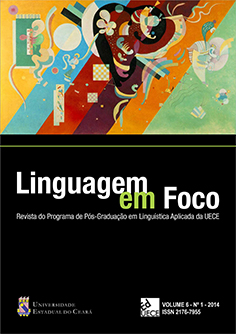A RECURSIVIDADE COMO PROPRIEDADE ÚNICA E UNIVERSAL DA FACULDADE DA LINGUAGEM
Keywords:
Recursividade, Sintaxe, Linguística Cognitiva, BiolinguísticaAbstract
A noção de recursividade há muito tem desempenhado um papel importante no desenvolvimento do campo da Linguística, mais especificamente na abordagem Gerativa em virtude da sua estreita relação com a sintaxe. Ao mesmo tempo, o conceito de recursividade é uma questão polêmica e tem sido motivo de grande debate na literatura recente (CHOMSKY, HAUSER e FITCH, 2002; PINKER & JACKENDOFF, 2005, entre outros). Não havendo um consenso sobre a sua definição, especula-se que o componente sintático recursivo seja único à linguagem humana e, principalmente, questionase a sua universalidade. Dessa forma, este artigo procura iluminar as questões problemáticas apresentadas acima, partindo de um panorama dos vários desdobramentos que o conceito apresenta no que diz respeito a seu tratamento na Linguística Cognitiva e culminando com as reivindicações relativamente recentes sobre a centralidade da recursividade no contexto da Biolinguística.
Downloads
References
CHOMSKY, N. Logical Syntax and Semantics: Their Linguistic Relevance. Language, v. 31, n. 1, p. 36 – 45.1955.
______ . New Horizons in the Studies of Language and Mind. Cambridge: Cambridge University of Press, 2000.
CHRISTIANSEN, M. H. Infinite Languages, Finite Minds: Connectionism. Learning and Linguistic Structure. University of Edinburgh Dissertation, 1994.
CORBALLIS, M. C. The Recursive Mind: The origins of human language, thought, and civilization. Princeton University Press, 2011.
DESCARTES, R. Discurso do Método: para bem conduzir a própria razão e procurar a verdade nas ciências. Tradução de Thereza Christina Stummer. São Paulo: Paulus, 2002.
FITCH, W. T.; HAUSER, M. D.; CHOMSKY, N. The evolution of the language faculty: clarifications and implications. Cognition, v. 97, p. 179-210, st. 2005.
______. The evolution of syntax: an exaptationist perspective. Frontiers in Evolutionary Neuroscience. v.3, n. 9, p. 1 -12. dez. 2011.
HAUSER, M. D.; CHOMSKY, N.; FITCH, W. T. The Faculty of Language: What Is It, Who Has It, and How Did It Evolve? Science Compass, v. 298. p. 1569-1579, nov. 2002.
HURFORD, J. The evolution of language and languages. Edinburgh University Press. p. 173-193, 1999.
______. Human uniqueness, learning symbols, and recursive thoughts. European Review, v. 12. p. 551-565, 2004.
JACKENDOFF, R.; PINKER, S. The Nature of the language faculty and its implications for language. Cognition, v. 97, p. 211-225, set. 2005.
KIRBY, S. Learning, bottlenecks and the evolution of recursive syntax. In: Linguistic Evolution Through Language Acquistion, Formal and Computation Models. Ed. T Brescoe. Cambridge: Cambridge University Press, 2002. p. 173-203.
LOBINA D. J.; GARCÍA- ALBEA, J. E. Recursion and Cognitive Science: Data Structure and Mechanism. Preceedings of the 31st Annual Conference of the Cognitive Science Society. p. 1337-1352, 2009.
PARKER, A. R. Evolution as a Constraint on Theories of Syntax: The Case against Minimalism. 2006. 357f. Tese de Doutorado (Doctor of Philosophy to Linguistic and English Language) - School of Philosophy, Psychology and Language Sciences, University of Edinburgh.
PINKER, S. Language as an Adaptation in the Cognitive Niche. In: KINKY, S.; Christiansen, M., Language Evolution: States of the Art. New York. Oxford University Press, 2003, p. 16-37.
__________; JACKENDOFF, R. The Faculty of language: what’s special about it. Cognition, v. 95, p. 201-236, mar. 2005.
PONTES JUNIOR, M. Introdução à Ciência da Computação II – Recursão. Instituto de Ciências Matemática e Computação – USP, p. 1 – 36, 2010.
RADFORD, A. Synthatic Theory and the Structure of English: a Minimalist Approach. Cambridge: Cambridge Univrsity Press. 1997.
ROSA, M. C. Introdução à (Bio) linguística: linguagem e mente. São Paulo: Contexto, 2010.
SANTIAGO, R. H. N.; BEDREGAL, B. R. C. Computalidade: os limites da computação. São Carlos, SP: SBMAC, 2004.
SOARE, R. Computability and Recursion. The Bulletin of Symbolic Logic, v. 2, n. 3, p. 284-321, 1996.
TOMALIN, M. Reconsidering recursion in syntatic theory. Downing College, Universtiy of Cambridge, 2007.
VAN DER HULST, H. (ed.). Recursion and Human Language. Berlin, New York: Walter de Gruyter, 2010.
Downloads
Published
How to Cite
Issue
Section
License
Copyright (c) 2019 Sidriana Scheffer Rattova

This work is licensed under a Creative Commons Attribution 4.0 International License.
Authors who publish in Linguagem em Foco Scientific Journal agree to the following terms:
- Authors retain the copyright and grant the journal the right of first publication. The articles are simultaneously licensed under the Creative Commons Attribution License which allows sharing the work with an acknowledgement of its authorship and initial publication in this journal.
- The concepts issued in signed articles are the absolute and exclusive responsibility of their authors. Therefore, we request a Statement of Copyright, which must be submitted with the manuscript as a Supplementary Document.
- Authors are authorized to make the version of the text published in Linguagem em Foco Scientific Journal available in institutional repositories or other academic work distribution platforms (ex. ResearchGate, Academia.edu).

























